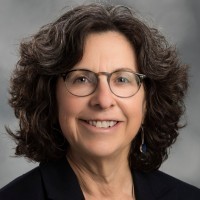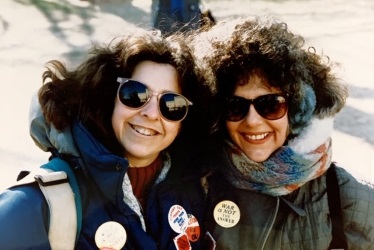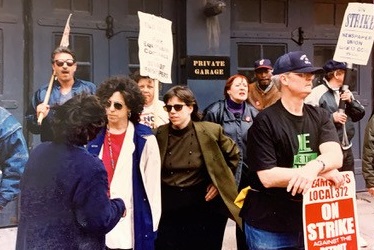Social Work Activists in Action: Listening, Learning and Action "" the story of Sara Gleicher

Housed in the heart of Detroit, the Wayne State University School of Social Work is committed to listening to and engaging with our community to advance social, economic and environmental justice. We take this responsibility seriously and recognize the role that such partnerships have in strengthening community capacity to address current and future challenges. In times of crisis, such as the current national call for racial equity and social justice, social workers spring into action and work with communities to empower sustainable change.
It is with this mission of both our School and profession in mind that we invite our Warrior Community to explore the rich history of social work activism through the stories of our trailblazing alumni. The first in this Social Work Activists in Action series will highlight community activist and MSW alum Sara Gleicher.
What led you to Social Work?

Social work was my second choice actually. Initially, I wanted to be a child psychologist. After completing my degree in child psychology from the University of Minnesota, I realized life was going to take me down a different path than I originally intended. I wanted to follow in my family's footsteps of political activism and the community organizing track in the Wayne State School of Social Work was a perfect fit. It gave me the opportunity to gain the skills I needed to take my need to question authority to the next level and develop real solutions to social problems that would make the world a better place. So back to my hometown of Detroit I went.
At the School, I was drawn to community organizing because it is dedicated to restoring democracy at the grassroots level and energizing citizens to become more active members of their society. It focuses on bringing people together to change policies and systems and bring about meaningful changes to peoples' lives, and in the process, empower vulnerable or oppressed populations.
What was the cause/movement you focused on during your career?

As a community organizer working with the late Maryann Mahaffey, a member of the Detroit City Council for 21 years, I learned about the importance of making sure that the people most affected by societal problems are "at the table", helping to identify and recommend solutions. My second job with a community mental health agency gave me valuable opportunities to learn how to write grants, direct programs and work hand in hand with people with mental illness and developmental disabilities to advocate for changes in welfare and budgetary policies at the state level. It was powerful to learn and recognize that every single person, no matter the disability - or ability - has something to give and contribute.
What tips do you have for activating change in communities when one is seen as an "outsider"?
My most recent job with Beaumont Health was as a community organizer to create and facilitate a Healthy Dearborn coalition to prevent chronic disease at the community and population health level. Here are a few tips I used when building that community coalition.
- Use data: Health is a uniting issue, and data showing high rates of disease among Dearborn residents helped convince people to join the initiative.
- Leverage your assets: With Healthy Dearborn the fact that I represented a major health entity in Beaumont who was one of the city's largest employers, and had the mayor and school superintendent as partners was a strong selling point to encourage participation.
- Develop relationships and build trust: Be completely honest and transparent. On the first day of the job, I was introduced to our city government partner who connected me to a prominent Dearborn Yemeni leader. Although initially skeptical, the leader was reassured by my connection with Maryann Mahaffey which told him "I was okay"! From that contact, I followed lead after lead and eventually built a coalition of more than 500 people. I was intentional about ensuring that people in the coalition reflected the diversity of Dearborn's population. The process I used was old fashioned community organizing - direct person to person contact, meeting and talking with them about their interests to make connections with the work of Health Dearborn.

What advice do you have for students and social workers in the field who want to empower social change in their communities?
I encourage every social worker to build on our strengths and core social work values to create change and get involved with others during this national emergency. The shocking cruelty and violation of human rights every day due to racism - whether it's African Americans being killed police or health disparities or incarcerated unjustly or whether it's refugee children who herded into crowded centers and separated from their families at the border - we need to recognize that every one of these actions violates the social work code of ethics - and is cruel and unjust.
The call to action is to not become desensitized to any injustice despite hearing about a new horrible practice, incident or policy every day. People everywhere, young and old, are taking bold actions - join them now. Use your skills and your energy to educate, organize, build bridges and advocate.
- Always be a learner: Learning involves watching, listening, asking questions. You will likely learn as much from the people you serve as you do from your colleagues. Identify a mentor and be deliberate in listening and learning from others; allow everyone the opportunity to share their expertise with you. Constantly seek out information about best practices and how you can do your job better.
- Reflect: Do the internal work of knowing and understanding yourself. Know what makes you react the way you do. Know what you might have to do to change those reactions. Learn from them.
- Never burn bridges: Treat everyone with respect even if you disagree with them. You will be surprised how often you will run into people later and need their support in some way.
- Don't go it alone: Learn to share information and share leadership so that everyone is working to achieve the common goal, and everyone can gain skills of leadership and activism in the process to build collective strength.
- Learn grant writing: This is a vital resource in the non-profit sector and a great way to get resources for marginalized community needs.
- Be the social worker you would want to have: Never see the user or person being served - whatever area you are working in - as 'the other'. Treat everyone as you would want to be treated.
- Be patient and respect the process: Give yourself time to learn about your job, organization, community. Be patient with the time it takes to achieve meaningful change. If you have clear goals, and you are working with others on the same aims, not doing it alone, you will succeed but it make take a little while.